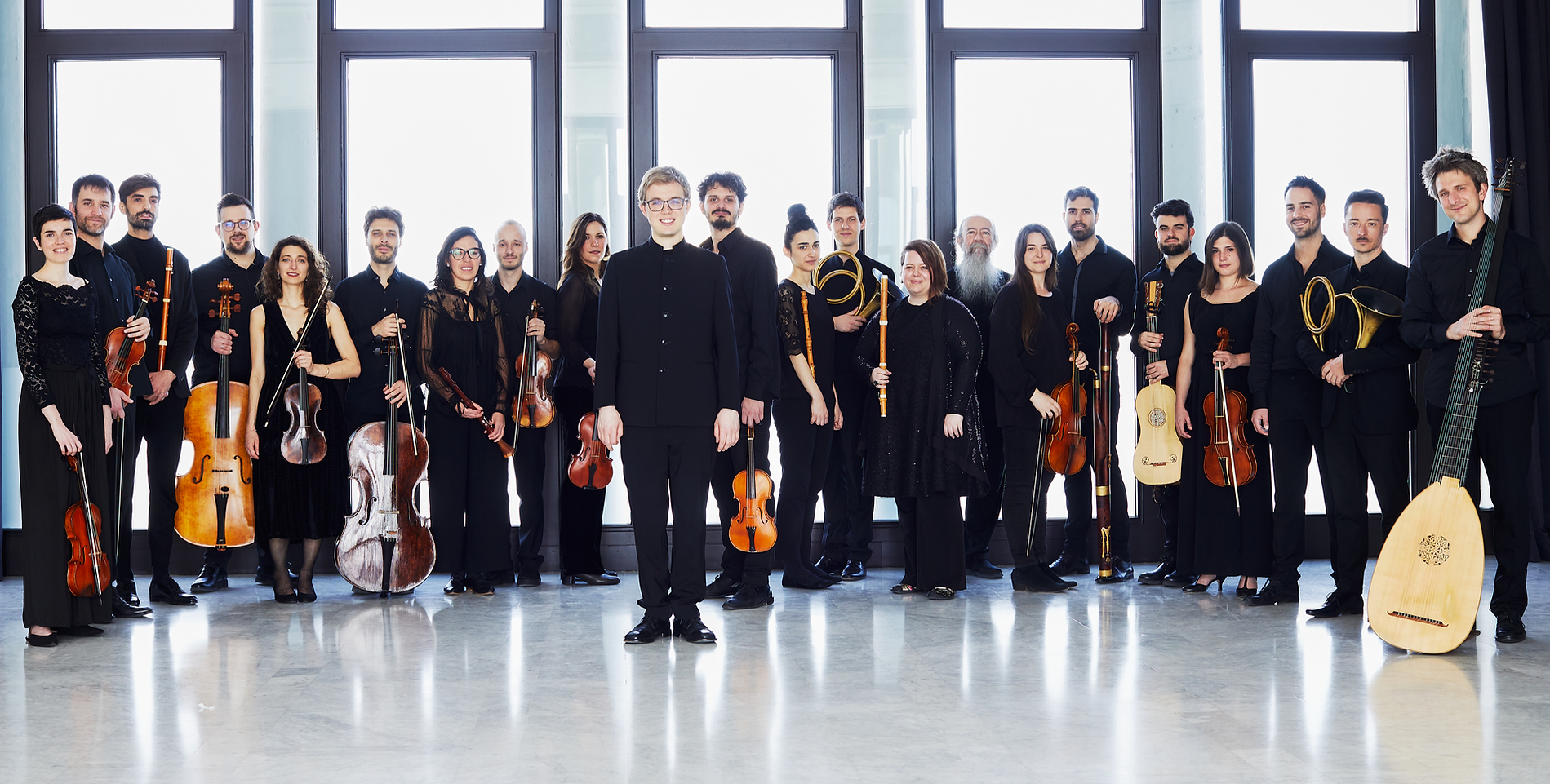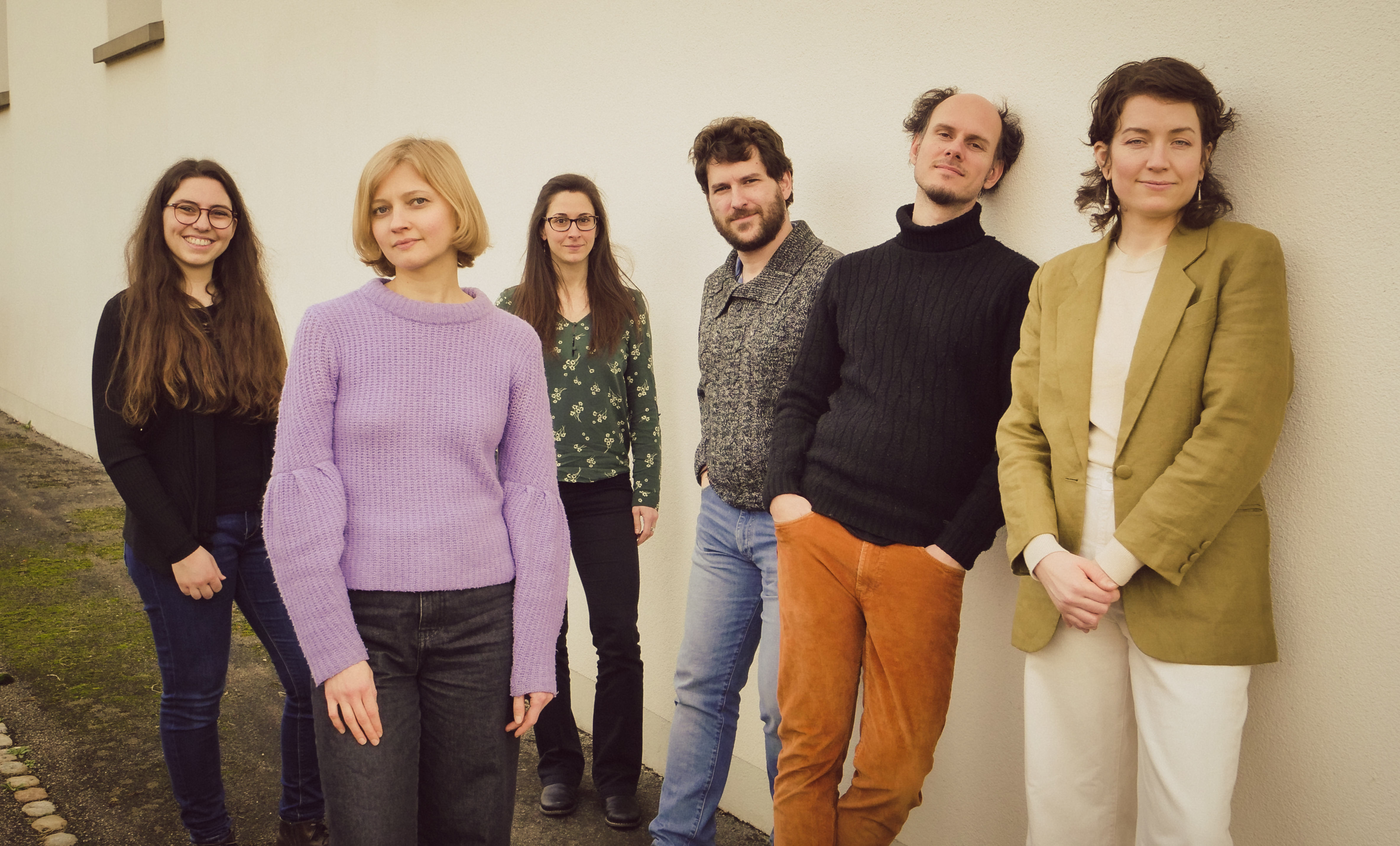GROUPS AND COLLABORATIONS

ACCADEMIA BAROCCA LUCERNENSIS
The Swiss baroque ensemble Accademia Barocca Lucernensis was founded in 2014 in Luzern by the Spanish orchestra conductor Javier Ulises Illán and the cultural manager Martin Caduff. Made up of a baroque orchestra, a professional choir, as well as a number of soloists and conductors who collaborate regularly, the Accademia Barocca Lucernensis offers their concerts in different cities in Switzerland.
In April 2019 they published their first CD – Sacred Music from Dresden Cathedral – with some works by Jan Dismas Zelenka and Johann Adolf Hasse with the Pan Classics label. With this album, Accademia Barocca Lucernensis was nominated in two categories of the Opus Klassik 2019 awards.
Visit website
ablucernensis.ch

CARDINAL COMPLEX
Cardinal Complex was founded by the cellist Alex Jellici and the two keyboard players Matías Lanz and Thomas Jäggi in 2017. The young group’s main goal is to perform music of the 17th and 18th centuries in a historically informed way and at the highest level, sometimes with unusual instrumentation and in lively tempi. Cardinal Complex functions as a pool of musicians ranging from the small quartet constellation up to big orchestral line-ups. A main emphasis lies on the strong and colourful instrumentation of the basso continuo group.
The name consists of “Cardinal” – The cardinal colour red, simbolizing the unrestrained musical passion shared among its members – and “Complex” in the sense of ‘complesso’ – Ensemble.
In its small formation as Cardinal Complex Quartet – Aliza Vicente, Luis Martínez, Alex Jellici and Matías Lanz – the group was awarded the 2nd prize at the 3. International Berlin Bach Competition in 2018.
Visit website
cardinalcomplex.com

CHIAVE D´ARCO
Chiave d’Arco ensemble was founded in 2015 after various years its members’ friendship and ensemble work. Various members have performed together at the European Union Baroque Orchestra (EUBO) or met during their studies in Switzerland in institutions such as Schola Cantorum Basiliensis, Zürcher Hochschule der Künste, Hochschule der Künste Bern or Hochschule Luzern.
The orchestra brings together up to 8 different nationalities: Switzerland, Italy, Spain, Germany, France, Russia, Slovakia and Poland. To bring together these different cultures and languages through music is the final goal of Chiave d’Arco. The possibility of configuring an ensemble in multiple formations – from string quartet to baroque orchestra – always promises thrilling concert programmes, as well as fresh and passionate performances.
In this context, Chiave d’Arco’s goal is not only to perform in important halls and music festivals, but also in more remote places for people who cannot easily attend live concerts. By applying their knowledge of historical performance practice, Chiave d’Arco tries to offer realistic performances, reaching the public in a modern and fascinating manner.
Visit website
cdarco.com

LOS ELEMENTOS
The Ensemble Los Elementos was born in 2018 with the aim of performing for the first time with period instruments the zarzuela Vendado es Amor, no es ciego, by the composer José de Nebra, one of the greatest exponents of Spanish baroque. Founded by Alberto Miguélez Rouco, it is made up of musicians of different nationalities, most of them linked to the Schola Cantorum Basiliensis in Switzerland. One of its main objectives is the performance, recovery and dissemination of Spain’s rich musical heritage, especially that of the 18th century. In 2019 the group recorded Vendado es Amor, no es ciego by José de Nebra in collaboration with the Schola Cantorum Basiliensis for the Glossa record label, a recording that obtained an excellent national and international repercussion, which led them to perform this zarzuela at the Festival de Amigos de la Ópera de La Coruña in 2020. Their second disc, Cantadas, a solo album by Alberto Miguélez Rouco dedicated to the sacred works of José de Nebra and Francisco Corselli, will be released in 2021, and the zarzuela Donde hay violencia, no hay culpa, also by José de Nebra, in October 2022, being the first world recording of the same.
Recently the ensemble has participated, together with Miguélez Rouco, in the cycle Universo Barroco at the Auditorio Nacional de Música in Madrid with Vendado es Amor, no es ciego; in February 2023 they will revive the great Miserere a 8 by José de Nebra in Basel; and in March 2023 they will perform Donde hay violencia, no hay culpa at the Teatro de la Zarzuela in a production by Rafael Villalobos.
Upcoming engagements include the opening of the Stockholm Early Music Festival in June 2023 and the recording of José de Nebra’s opera Venus and Adonis.
Visit website
loselementosensemble.com

PHAEDRUS
The ensemble Phaedrus aims to rekindle the forgotten sound of the Renaissance traverso consort for modern audiences, performing Western polyphony of the 16th and early 17th centuries.
Formed during their studies at the Schola Cantorum Basiliensis, the members of Phaedrus come from around the world—USA, Russia, Spain, Slovenia, Italy and Switzerland—giving each performer the opportunity to lend their unique and distinguished perspective to the interpretation of the music performed on stage. During their studies at the SCB, the ensemble was guided collectively and individually by teachers such as Anne Smith, Johanna Bartz, Dominique Vellard, Peter Croton, Crawford Young, Marc Lewon and Baptiste Romain.
Originally a four-piece consort, Phaedrus is now enriched by the membership of Miriam Trevisan (voice) and Bor Zuljan (lute) to delve even further into the relationship of the Renaissance traverso to the human voice, as well as to contemporary instruments from the time period. Phaedrus performs on flutes made by the renowned maker, Giovanni Tardino, after the original consort of flutes which survive in the Accademia Filarmonica in Verona. The ensemble was brought together by a shared fascination with the powerful yet refined beauty of Renaissance music, as well as the humanist philosophy and rhetorical practices which gave music its distinctive character in the 16th and 17th centuries. With this in mind, the name ‘Phaedrus’ was chosen from Plato’s classic text in which Socrates claimed that the art of rhetoric flowed from madness, divine inspiration, and above all else, love.
Visit website
ensemblephaedrus.com

SVAPINGA CONSORT
The Svapinga Consort combines the sweet sound of historical instruments with a rhetorical, speaking style of playing. Its musicians are characterised by a special passion for stylistic diversity, artistic self-reflection and interpretative consistency. In innovative formats and unconventional concepts, the ensemble brings music from the Renaissance to the early 20th century to life and makes it a sensual experience.
The Svapinga Consort is led by Maria Raffaele (oboe) and Sofya Gandilyan (keyboard instruments). For larger ensembles, Amy Shen (violin & viola) and Anderson Fiorelli (violoncello) regularly participate, with other musicians joining in depending on the repertoire. In Munich, the ensemble has been organising its own concert series since 2016, as well as an extensive educational programme for younger people. In addition, the ensemble regularly performs in Germany and abroad and cooperates with ensembles such as InVocare Basel and the Freiburg Chamber Choir.
The Svapinga Consort has a special focus on German court music. From the Munich court chapel under Orlando di Lasso in the 16th century to Pisendel’s famous Dresden orchestra, these ensembles have long been musical melting pots and centres of attraction for musicians from all over Europe. The diversity of repertoire, instruments and instrumentation that lies dormant here is constantly being explored and translated into sound by the members of the Svapinga Consort. Other focal points of the ensemble are the music of the seconda pratica around 1600 as well as wind chamber music of the 19th century.eiburger Kammerchor.
Visit website
svapingaconsort.com